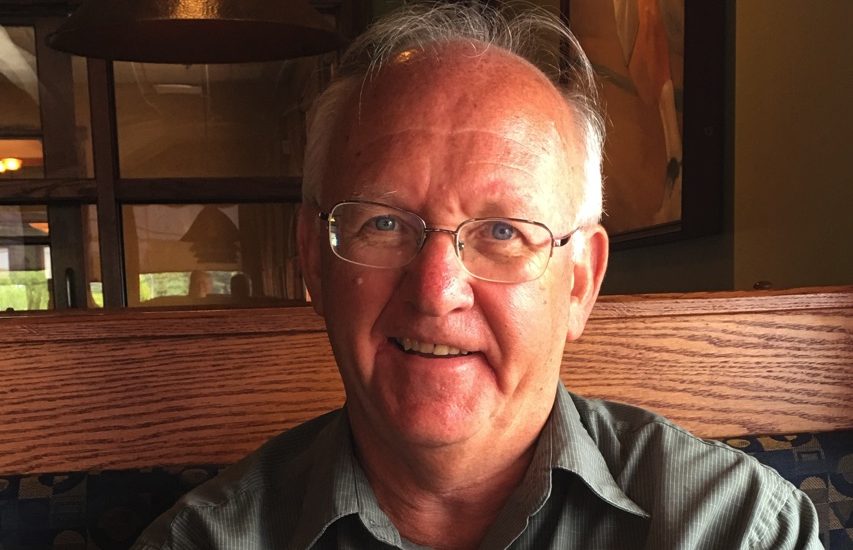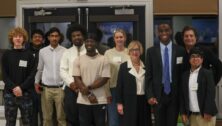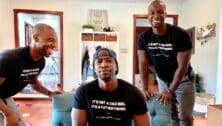Chester County Leadership: Bruce Mowday, Author and President at The Mowday Group

Bruce Mowday, former Daily Local News’ managing editor, prolific author and president of The Mowday Group who is on the cusp of a big book release about the Wyeth art heist in 1982, spoke with VISTA Today about growing up in Valley Township, playing baseball, developing a passion for classical music and then writing, his first job in journalism at the Coatesville Record, and some of the most interesting stories he’s covered in his career.
Mowday also discussed what led to his new book, Stealing Wyeth, about the theft of 15 paintings worth millions of dollars from Andrew Wyeth’s estate, as well as one big surprise he may have learned while writing the book.
Where were you born, and where did you grow up?
I’m pretty much a Chester County boy. I was born the oldest of three children in 1950 at the old Coatesville Hospital on Valley Road and grew up in Westwood in Valley Township. I went to the old Westwood school to South Brandywine to Scott before becoming the first graduating class at the new senior high school in 1968.
What did your parents do?
My dad always loved the printing business. He was in the Navy during WWII and was the printer on board of his ship. He did not talk much about his war experience. When he got out of the Navy, he moved to Westwood and married my mom. For a long time, he worked at the old Capital Bakery. It was so great to smell that bread in the mornings growing up. He spent a lot of years at the bakery, and I got to know Chester County well when my dad became a Supervisor of the Bakery, and I would go on deliveries with him.
Even though he worked at the bakery for many years, my father’s passion was always in printing and newspaper. He became a compositor for the old Coatesville Record. He retired from there.
What memories do you have of growing up in Westwood?
It was such a different time. You did not have to lock the doors at night because you felt safe. I would walk to school. My parents always knew where I was because my school was only a few blocks away. Right after dinner, I would head over to play basketball, baseball, or football on the school grounds. Life was easy.
Did you play sports growing up?
On Saturday afternoons, I would play on the Westwood midget baseball team at the firehouse. I remember the field being down the slope of a hill. We would play with kids from Highland and Unionville, so I would meet kids from outside of Westwood. I was a pitcher and third basemen. I was big for my age, but I haven’t really grown much since.
Were you pretty good at baseball?
I remember overhearing a conversation between my parents once. My mother asked my dad if I was good at baseball, and my dad responded, “he’s better than most here, but he’ll never make any money out of it.” I was pretty good for my age, but I couldn’t hit a curveball.
What about basketball? Did you play?
I played in junior high school but was the last man cut from the team in high school. I remind Ross Kershey that he cut me from Coatesville’s basketball team every time I see him! After he cut me, I went and played on the local YMCA team that was better than most high school teams.
What kind of music were you listening to back then?
I didn’t like the popular music when I was a kid. I am a big fan of classical music. I love violins – Hillary Hann is a big favorite of mine. I remember seeing her live in Wilmington. Over the years, I’ve developed a good ear during an orchestra performance. I can identify what instruments are playing.
Where did that passion for classical music come from?
Growing up, we listened to music on the record player on Sunday afternoon. My dad liked the big show tunes, while my mom liked country western. I was the oddball who liked classical. I do remember a teacher asking me who my favorite singer was in 7th grade, and I said, “a young woman named Barbra Streisand.” If I got to the phonograph first after Sunday dinner, I would play the Streisand records.
What were your first jobs?
I spent all of my time on the playground when I was younger. I helped a friend with a newspaper delivery route and did odd jobs around town. I didn’t have a steady job until high school. I didn’t want for much. Even when I was old enough to drive a car, I was looking at getting a new bike! My uncle sold me my first car, a 1955 Plymouth, for $1. I hand-painted the car and it glowed in the dark!
My first real job was at Coatesville Record. I was finishing up my junior year in high school and went to a Boys State convention. I was one of the local representatives who went up to Penn State University and spent a few weeks. There were kids from all over the state there and we learned about government, politics, and a host of other topics. My dad picked me up at the end of the convention and told me I would start working the next day in the press room down in the basement Coatesville Record.
This was during the hot metal type days. They wouldn’t allow me around the hot metal, but I never worked so hard in my entire life. The hot kiln was going all the time, and there was no air conditioning. In the afternoons, I would take 12,000 copies off of the old press, put them on the dumb waiter and pulling them by hand up to the next floor so they could be given to the delivery people. Depending on the size of the paper, sometimes I was lifting twenty-five or forty papers at a time.
How did you work your way up out of the basement?
The editor of the Coatesville Record was a guy named Ralph Flamminio gave me a story assignment. Ralph was an old-school, gruff journalist who taught me a lot. He came down to the basement one day, cigarette dangling out of his mouth and said, “your dad tells me you like to write.” Ralph told me he needed a high school football camp covered and asked me to write a story. That was my first assignment!
From that point on, I covered all high school sports for the Record, which was a daily newspaper. After one feature article about a Thanksgiving Day football game between Coatesville and Downingtown, one guy told me didn’t know I knew that many words! I love sports, and I loved telling stories in a way people could enjoy reading about the game or the player.
After a year or two, all the basketball, football, and baseball games all started to look the same to me, so I asked to be assigned the more hard-hitting news stories. I was drawn more to those stories, and I was successful at it. I was curious, trustworthy, and enjoyed going out uncovering stories. I was always a good reporter, and this helped me refine my writing skills in the process.
Similar to classical music, it seems like writing spoke to your soul as well.
Absolutely. I remember when the writing bug hit me. When I was thirteen, my grandmother gave me a few clippings from the New York Sunday Mercury about the Civil War written by my great-great-great grandfather. Those clippings, coupled with my father’s love of print, really sparked my interest in writing and history. I also have a cousin who owns a newspaper in Maine, so newspapers is a real family affair!
Did you go to college?
I have a degree in computer programming from ICM on north Broad Street in Philadelphia. My editor at the Record was very unhappy because he wanted me to get a journalism degree. I had been accepted at a few places but wanted to try my hand in business. I went to West Chester University to study journalism and history there. By that time, I was married, as well as working full time and going to school full time.
Who were the people that propelled you in your career?
Well, certainly Ralph Flamminio from the Record and Bob Klewans my high school journalism teacher.
After I received my computer degree, I was working in business and writing part-time when I met Bob Shumaker, who was managing editor of the West Chester paper at the time. I asked him to get me a job, and he said call Hannah Gardner. I called her right away for an interview. I showed up in my suit and tie, and she looked at me and said, “what are you doing dressed like that? Here’s the story, go cover it.”
I was told a guy was living in a railroad car in Elverson, go write a story. When I came back, they hired me! I covered the more intense news stories as a correspondent for a few months.
One day, they called me in saying the courthouse reporter quit and they asked me to fill the role. I had never even been in a courthouse! I didn’t know any judges or the lawyers. I was out there by myself and learned a great deal. There were some great judges during my time – Judge Leonard Sugarman, D.T. Marrone, John Stively, Thomas Pitt – who gave me an education and showed me the ropes.
Attorneys like Robert Gawthrop, Tom Wilson, Bill Gallagher, John Duffy, Bill Scott, and so many more were good at giving me information and turning me on to great stories. I spent thirteen years covering the courthouse. I covered the Johnston gang before they were murderers. That story never seems to end.
Looking back over your career, do you have a favorite story, moment, or person?
I have a couple stories that really stick with me. There was one year that all I wrote was columns three or four times a week. I always thought that was the hardest job I had. One day, Bill Scott called and asked what I was doing. He picked me up and took me to a housing project not too far from where the Daily Local News building. He took me to this an apartment and introduced me to a grandfather and grandmother who were taking care of their grandchildren.
Their daughter had stopped to help a victim of a drunk driving accident when she was struck and tragically killed by another drunk driver. Bill explained these grandparents were struggling to help the kids and asked me to write a column about it. I did, and the family was picked up by one of the service clubs in West Chester as their Christmas service project. The stories that stuck with me most are the ones where I knew I was helping people.
Another story that comes to mind is one involving John Duffy, the defense attorney I mentioned earlier. Duffy was a flamboyant criminal defense attorney and was known as one of the best defense attorneys in the county for many years. I wrote a column about this woman who was having trouble getting her kids back in an ugly custody battle and how the system itself was hurting her.
A few days later, I was in the law library when I saw John Duffy. John asked me to come talk to him in the back corner of the library. When he was sure no one could see or hear, he picked me up by my collar, thrust me against the wall, and told me he was helping that woman, and that I better not dare tell anyone he was doing it. Shortly after that talking-to, the woman received some representation and gained custody of her children back.
You’re on the cusp of a big book release about the Wyeths, Bruce. How you got into the subject and what led to the book?
Stealing Wyeth is coming out next month. I was covering the courthouse when someone broke into Andrew Wyeth’s estate and stole fifteen paintings worth millions of dollars.
I covered the story as it unfolded, which led me to a lot of the background and allowed me to get to know the major players of the case – the police officers, FBI, and lead investigators.
I also worked with many of the individuals through my time as a court reporter, especially with the Johnston gang trials. I had a great interest in the case and wanted to write about it.
After the police got the paintings back, they hadn’t gone public yet because not every involved in the crime had been apprehended yet. I knew something was up by the aura in the courthouse; no one would talk to me.
I finally went into the county’s Chief Detectives Office – Charlie Zagorski – and he wouldn’t tell me until I promised not to write anything until he said it was okay. I usually didn’t make promises like that, but I wanted to know. They were still searching for one guy.
I walked out of Charlie’s office and ran into John Duffy, who told me they got the paintings back. I held my breath and didn’t tell him I already knew. I had promised Charlie I wouldn’t tell anyone and I wanted to be the guy who people knew they could trust.
It was a great investigative story – the people involved and how they got the paintings back. I knew I needed the Wyeth’s cooperation, so I went to the museum and spoke with the people I needed to.
Andrew’s wife Betsy was afraid that people would break in again if there was a renewed interest in the story. For a while, they didn’t want to speak about it. Four years ago, I finally went to the curator and contacted Andrew’s son Jamie, saying, “everyone’s memory is starting to go.” I said I would run everything by them and they agreed to let me interview everyone. The Wyeth’s have been very helpful. Jamie himself picked the cover of the book.
What did you learn from doing the book that you didn’t know before?
The big surprise is that I might be related to one of the burglars!
I also learned a lot through the investigation – what they did, how law enforcement turned people, and the strategies used to turn Bennie LeCorte and Frannie Matherly. Bennie was one of the criminals involved with the Johnstons. Frannie was one of the most skilled fences in Chester County.
The strategy to apprehend the thieves was much more intricate than I knew. They were paying gambling debts with some of the paintings so the Feds began flipping some of the individuals involved through those channels. The book really goes into this piece of the story – how the FBI and (state police) were able to solve the crime.
The burglars had trouble selling the paintings because they were so well known. There’s a story that one of the guys asked someone for a ride to the airport and said he’d give the guy a Wyeth.
You have a great love of stories, don’t you?
Yes, I really do. I only write about stories that really interest me, especially because I have to spend three or four years researching and then talking about the topic. I like “people stories” – good or bad. I’ve written about Richie Ashburn, Jim Herr, and the Johnston Gang. I enjoy exploring real-life people and events.
Why the love of storytelling?
With the Johnston’s, there’s so much there to peel back and try to get to the root of their madness. On the other side, people have done such great things against great odds.
With Jim Herr, he started out with absolutely nothing. He treated people with respect and kept his word, and he built an empire out of it.
Richie Ashburn treated a young fan with respect, and that fan helped him get into the Hall of Fame later in life.
People tell me I’m all over the place with my writing, but really I’m just writing stories about fascinating people.
Finally, Bruce, what’s the best piece of advice you were ever given?
My mom telling me to take a typing class in high school had a pretty profound impact on my life! It wasn’t a college prep course, and my mom suggested I take it. I can’t begin to express how something so simple truly kickstarted my career.
She also told me to get a job at Lukens Steel Company and said I’d have a job for the rest of my life. So I can’t say she was always right.
Connect With Your Community
Subscribe to stay informed!
"*" indicates required fields
























![95000-1023_ACJ_BannerAd[1]](https://vista.today/wp-content/uploads/2023/03/95000-1023_ACJ_BannerAd1.jpg)























